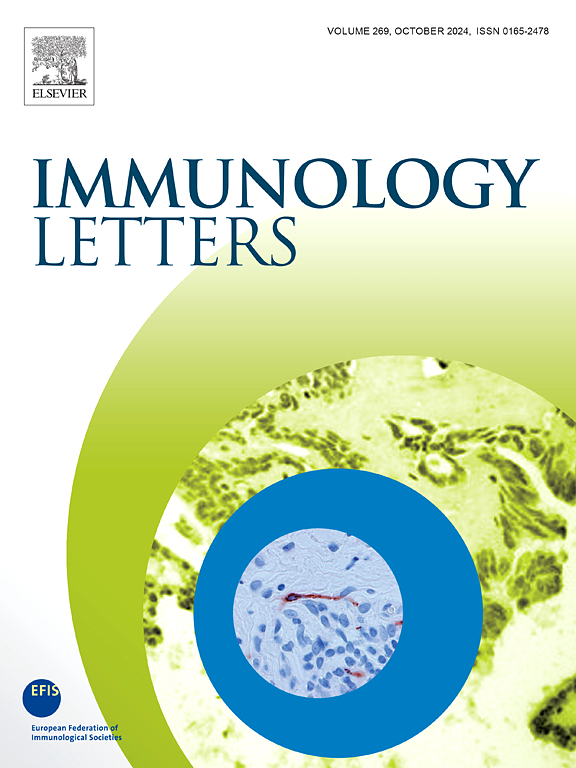脂质代谢异常对不同年龄小鼠结肠固有层免疫衰老的影响
IF 3.3
4区 医学
Q3 IMMUNOLOGY
引用次数: 0
摘要
免疫衰老是一种与年龄相关的免疫功能变化。肠黏膜免疫系统被认为是人体最大的免疫系统,其免疫衰老与多种疾病的发生和发展密切相关。近年来,研究发现高脂饮食(HFD)诱导的脂质代谢异常与免疫之间存在重要的相关性,但HFD对结肠粘膜免疫衰老的影响和机制仍不清楚。本研究通过给雄性野生型小鼠喂食高脂饮食,建立了不同年龄的脂代谢异常模型,并比较了反映全身免疫的脾脏和反映局部免疫的结肠固有层(LP)的免疫衰老情况。结果表明,HFD可导致不同年龄段小鼠脂质代谢异常,加速全身和局部免疫衰老,增加结肠组织炎症因子的表达。HFD诱导的异常生化指标水平与免疫衰老相关的T细胞亚群比例密切相关。总之,研究结果表明,HFD 对衰老小鼠的影响最为显著。这项研究为进一步了解脂质代谢异常与肠粘膜免疫衰老之间的关系提供了新思路。本文章由计算机程序翻译,如有差异,请以英文原文为准。
The effect of abnormal lipid metabolism on immunosenescence of the colonic lamina propria in mice of different ages
Immunosenescence is an age-associated change in immunological function. The intestinal mucosal immune system is considered the largest immune system in the human body, and its immunosenescence is closely related to the occurrence and development of many diseases. In recent years, studies have identified a crucial correlation between abnormal lipid metabolism induced by high-fat diet (HFD) and immunity, but the effect and mechanism of HFD on colonic mucosal immunosenescence are still unclear. In this study, we established an abnormal lipid metabolism model at different ages by feeding male wild-type mice HFD and compared the immunosenescence of the spleen, which reflects systemic immunity, and the colonic lamina propria (LP), which reflects local immunity. The results showed that HFD could lead to abnormal lipid metabolism at different ages, accelerate systemic and local immunosenescence, and increase the expression of inflammatory factors in colonic tissue. The levels of abnormal biochemical indicators induced by HFD were closely related to the proportions of T cell subsets associated with immunosenescence. Overall, the results showed that HFD had the most significant impact on aged mice. This study provides new ideas for further understanding the relationship between abnormal lipid metabolism and intestinal mucosal immunosenescence.
求助全文
通过发布文献求助,成功后即可免费获取论文全文。
去求助
来源期刊

Immunology letters
医学-免疫学
CiteScore
7.60
自引率
0.00%
发文量
86
审稿时长
44 days
期刊介绍:
Immunology Letters provides a vehicle for the speedy publication of experimental papers, (mini)Reviews and Letters to the Editor addressing all aspects of molecular and cellular immunology. The essential criteria for publication will be clarity, experimental soundness and novelty. Results contradictory to current accepted thinking or ideas divergent from actual dogmas will be considered for publication provided that they are based on solid experimental findings.
Preference will be given to papers of immediate importance to other investigators, either by their experimental data, new ideas or new methodology. Scientific correspondence to the Editor-in-Chief related to the published papers may also be accepted provided that they are short and scientifically relevant to the papers mentioned, in order to provide a continuing forum for discussion.
 求助内容:
求助内容: 应助结果提醒方式:
应助结果提醒方式:


